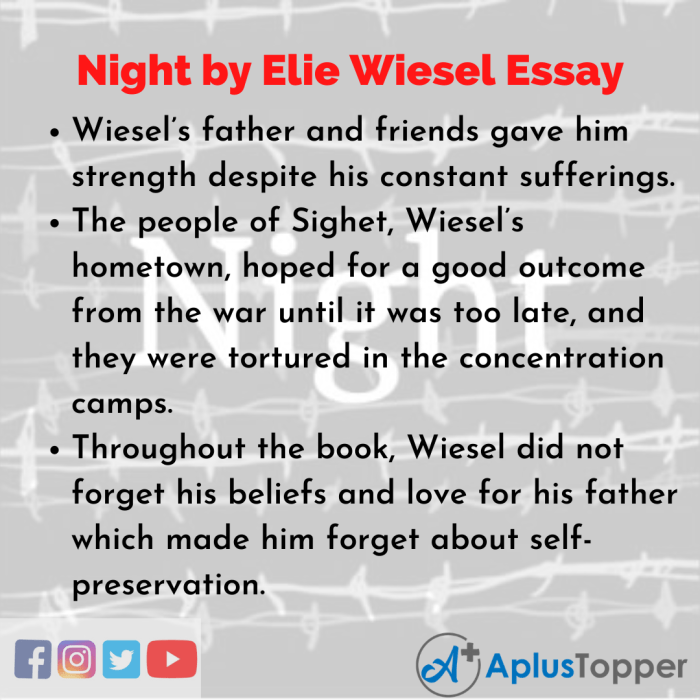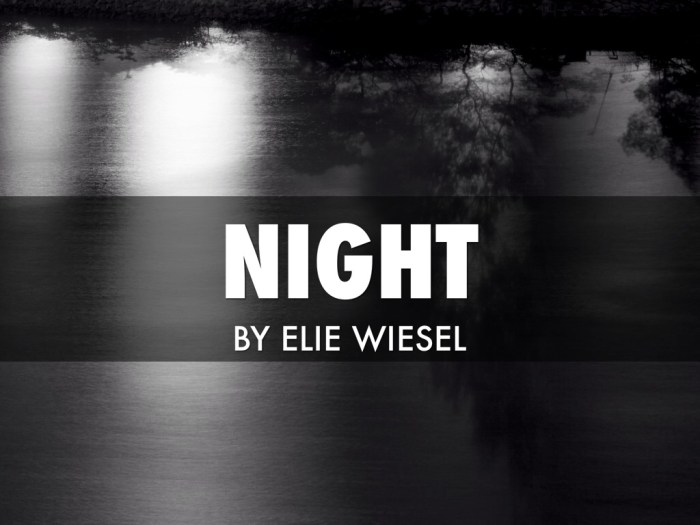Questions for Night by Elie Wiesel embark on an introspective journey into the harrowing depths of the Holocaust, delving into the literary and philosophical complexities that define this seminal work. Wiesel’s poignant narrative invites us to grapple with the profound questions that haunt the human experience in the face of unimaginable suffering and atrocity.
Through an exploration of literary techniques, character development, and philosophical themes, we will uncover the profound impact of “Night” on readers and its enduring relevance in understanding the complexities of human nature and the enduring legacy of the Holocaust.
Historical Context: Questions For Night By Elie Wiesel

The Holocaust, the systematic genocide of European Jews by Nazi Germany during World War II, profoundly shaped Elie Wiesel’s life and writing. As a survivor of Auschwitz and Buchenwald, Wiesel’s experiences in these concentration camps left an indelible mark on his soul.
Wiesel’s work is characterized by a deep exploration of the memory and trauma of the Holocaust. Through his writing, he attempts to bear witness to the horrors he endured and to ensure that the world never forgets the victims of Nazi atrocities.
Literary Techniques
Symbolism
Wiesel employs powerful symbolism throughout “Night.” Fire, for example, represents both destruction and purification, while darkness symbolizes the horrors of the Holocaust.
Metaphor
Wiesel also uses metaphors to convey complex emotions and ideas. For instance, he describes the prisoners as “walking corpses,” highlighting the dehumanizing effects of the camps.
Imagery
Wiesel’s vivid imagery transports readers directly into the horrors of the Holocaust. His descriptions of the stench of burning flesh and the screams of the dying create a visceral and unforgettable experience for readers.
Characterization
Eliezer
Eliezer, the protagonist of “Night,” undergoes a profound transformation throughout the novel. Initially a devout Jew, his faith is shattered by the horrors he witnesses in the camps.
Supporting Characters
Other characters, such as Eliezer’s father and Akiba Drumer, play significant roles in the novel. His father represents the traditional Jewish values that Eliezer struggles to maintain, while Akiba represents the spiritual resilience of the Jewish people.
Philosophical Themes

Faith and Doubt
“Night” explores the complex relationship between faith and doubt in the face of adversity. Eliezer’s initial belief in God is shaken by the horrors of the Holocaust, leading him to question the existence of a benevolent deity.
Ethical Dilemmas
Wiesel also raises ethical dilemmas posed by the Holocaust. The novel confronts readers with questions about the limits of human compassion and the responsibility to resist evil.
Symbolism and Motifs
Recurring Symbols
- Fire: Destruction and purification
- Darkness: Horrors of the Holocaust
- Train: Journey to the camps and symbol of death
These symbols contribute to the novel’s overall meaning, highlighting the horrors of the Holocaust and the struggle for faith and survival.
Impact and Legacy
Impact on Readers
“Night” has had a profound impact on readers worldwide. It has raised awareness of the Holocaust and challenged readers to confront the horrors of human cruelty.
Enduring Relevance, Questions for night by elie wiesel
The novel remains relevant today, serving as a reminder of the dangers of hatred and intolerance. It also provides hope and inspiration for those who face adversity.
Question & Answer Hub
What is the significance of “Night” in Elie Wiesel’s life and writing?
As a Holocaust survivor, “Night” represents Wiesel’s personal account of the horrors he endured during the Nazi regime, serving as a powerful testimony to the atrocities committed.
How does Wiesel employ literary techniques to convey the impact of the Holocaust?
Wiesel uses symbolism, metaphor, and imagery to create a vivid and haunting depiction of the Holocaust’s brutality, evoking a visceral response in readers.
What is the role of Eliezer as the protagonist of “Night”?
Eliezer’s journey represents the universal struggle for faith and identity in the face of adversity, embodying the complexities of human resilience and vulnerability.
How does “Night” explore the ethical dilemmas posed by the Holocaust?
Wiesel confronts the moral ambiguities and ethical quandaries that arise in extreme circumstances, challenging readers to grapple with the boundaries of human compassion and responsibility.
What is the enduring legacy of “Night” in Holocaust literature?
“Night” has become a cornerstone of Holocaust literature, serving as a poignant reminder of the horrors of the past and a powerful advocate for human rights and the prevention of future atrocities.